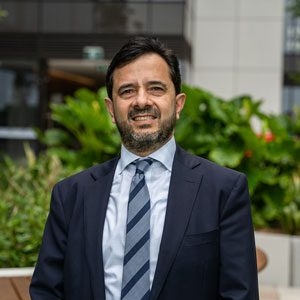- Our Doctors
- Prof Nick Pavlakis

Prof. Nick Pavlakis
BSc MBBS MMed PhD FRACP, Medical Oncologist
For patients/carers
For doctors
BSc MBBS MMed PhD FRACP, Medical Oncologist
Locations
Clinical interests
- Gastrointestinal cancer
- Lung cancer
Languages
Fluent
- English
- Greek / ελληνικά
Biography
Clinical interest in lung and gastrointestinal cancers, mesothelioma and neuroendocrine tumours (NETs).
Nick is a medical oncologist with clinical interests in lung cancer, mesothelioma, gastrointestinal cancers, and neuroendocrine tumours (NETs).
Nick is a supportive and caring clinician who has over 20 years experience. He is passionate about his clinical research interests and strives to provide high-quality care, offering empathy and hope.
Nick commenced clinical practice in 1998 while also undertaking a PhD evaluating a new cancer treatment, and a Masters in Clinical Epidemiology. His clinical experience has been in both public and private practice, whilst also contributing to rural health care, initially by conducting an outreach clinic to Lismore Hospital and, since 2001, to Armidale Hospital.
Nick participates with his peers in multidisciplinary team meetings in lung cancer, upper gastrointestinal cancers, colorectal cancer, pancreatic cancer, hepatobiliary cancer, and neuroendocrine tumours (NETs) - which he chairs.
In 2020, Nick led the team that received the International Centre of Excellence Award from the European Neuroendocrine Tumour Society for the NETs service, based at Royal North Shore Hospital and GenesisCare.
More information
Nick is the current Board Chair of TOGA, former ALTG president and past President of COSA, a member of the AGITG Upper Gastrointestinal Cancer Working Party, and committee and faculty member with the International Association for the Study of Lung Cancer, a global multidisciplinary organisation dedicated to eradicating lung cancer. Professionally, he has also served on the Executive of the Medical Oncology Group of Australia (MOGA) and the Private Cancer Physicians Group of Australia (PCPA). Nick was the inaugural NSW Cancer Institute appointed Director of the Northern Sydney Cancer Trial Trials Network, and Clinical Trials Director and Clinical Services Director, GenesisCare (Formerly Northern Cancer Institute), St Leonards, Sydney, since 2012.
- From a patient advocacy perspective, Nick is dedicated to helping promote research and evidence-based care in lung cancer and mesothelioma, gastrointestinal cancers, and NETs.
- He has achieved this through active involvement in various collaborative research organisations, their fundraising arms and advocacy organisations such as the Thoracic Oncology Group of Australasia (TOGA), formerly the Australasian Lung Cancer Trials Group, The Australasian Gastrointestinal Trials Group (AGITG), The Clinical Oncology Society of Australia (COSA), The GI Cancer Institute, Pankind (Formerly the Avner Foundation) and NeuroEndocrine Cancer Australia (formerly the Unicorn Foundation).
- He has participated in clinical Practice Guideline development for lung cancer, mesothelioma, pancreatic cancer, and NETs while also being involved as faculty in National and International scientific meetings, served on numerous International and National Advisory panels, and contributed to consumer advocacy training.
- Nick is interested in clinical research in gastric cancer, lung cancer, and NETs.
- He has supervised 7 medical PhD candidates (in lung cancers, pancreatic cancer, and NETs) and over 35 RACP medical Oncology Advanced trainees since 2002, now practicing in centres across Australia.
- He continues to teach broadly and examines aspiring specialist candidates as a member of the Senior Examining Panel for the Royal Australasian College of Physicians.
- In 2021, Nick was made full conjoint Professor of Medicine at Sydney University.
Explore more
Disclaimer:
This website is provided for information purposes only. Nothing on this website is intended to be used as medical advice, or to diagnose, treat, cure or prevent any disease. It should not be used as a substitute for your own health professional's advice. Any medical procedure or treatment carries risks. Before proceeding with treatment, you should discuss the risks and benefits of the treatment with an appropriately qualified health practitioner. Individual treatment outcomes and experiences will vary.




